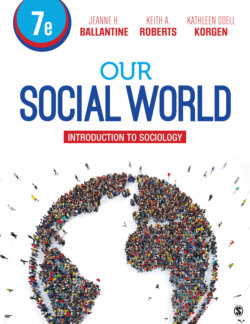Читать книгу Our Social World - Kathleen Odell Korgen - Страница 155
На сайте Литреса книга снята с продажи.
Importance of Socialization
ОглавлениеIf you have lived on a farm, watched animals in the wild, or seen television nature shows, you probably have noticed that many animal young become independent shortly after birth. Horses are on their feet in a matter of hours, and by the time turtles hatch from eggs, their parents are long gone. Many species in the animal kingdom do not require contact with adults to survive because their behaviors are inborn and instinctual. Generally speaking, the more intelligent the species, the longer the period of gestation and of nutritional and social dependence on the mother and family. Humans clearly take the longest time to socialize their young and to teach them how to survive. Even among primates, human infants have the longest gestation and dependency period, generally 6 to 8 years. Chimpanzees, very similar to humans in their DNA, take only 12 to 28 months (see Table 4.1). This extended dependency period for humans—what some have referred to as the long childhood—allows each human being time to learn the complexities of culture. This suggests that biology and social processes work together.
▼ Table 4.1
Note: Lemurs and monkeys, among the less complex members of the primate order, depend on adults for food for a much shorter time than do apes and humans. The period of dependence affords human infants time to absorb the extensive knowledge important to the survival of the species.
Normal human development involves learning to sit, crawl, stand, walk, think, talk, and participate in social interactions. Ideally, the long period of dependence allows children the opportunity to learn necessary skills, knowledge, and social roles through affectionate and tolerant interaction with people who care about them. Yet what happens if children are deprived of adequate care or even human contact? The following section illustrates the importance of socialization by showing the effects of deprivation and isolation on normal socialization.
▲ This family shares a playful moment together as they interact with one another. Even in such carefree moments, parents act as socializing agents for their children.
© Anthony ASAEL/Gamma-Rapho/Getty Images
